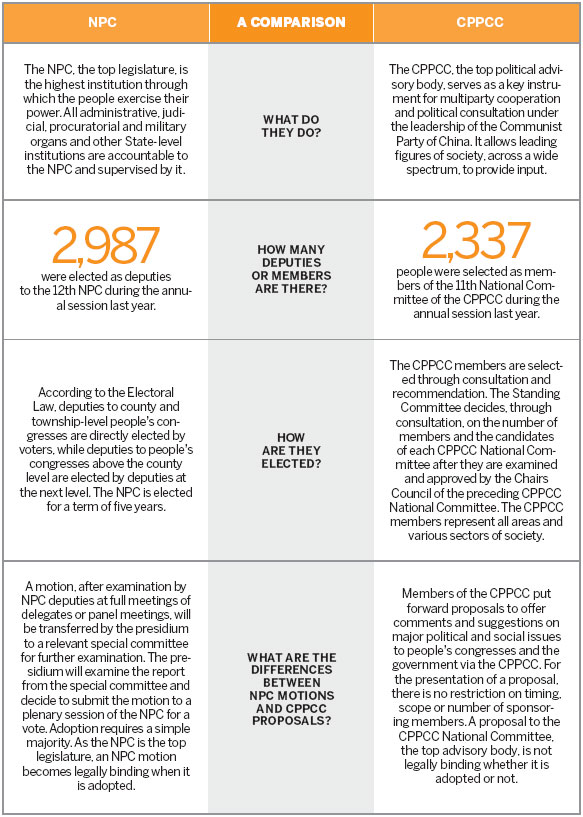 Large Medium Small
Large Medium Small

1. What are the sessions?
The "Two Sessions" is shorthand for the annual sessions of the National People's Congress (NPC) and the National Committee of the Chinese People's Political Consultative Conference (CPPCC).??

2. What's the schedule and agenda?
![]()
On March 2, the CPPCC will hold a news conference, with a spokesperson answering questions from the domestic and overseas media.
![]()
On March 3, the session of the CPPCC will open. Members of the CPPCC National Committee will attend the opening ceremony.
![]()
On March 4, the NPC will hold a news conference, with a spokesperson answering questions from the domestic and overseas media.
![]()
On March 5, the NPC session will open. The premier will deliver the annual government work report, and NPC deputies will review the report. Both deputies to the NPC and members of the CPPCC National Committee will attend the opening ceremony and hear the premier's report.
The NPC session will also hear and deliberate work reports by the NPC Standing Committee, the Supreme People's Court and the Supreme People's Procuratorate.
The NPC agenda also includes: implementation of the annual plan on economic and social development in 2013; a draft plan on national economic and social development in 2014; central and local budgets in 2013; and draft central and local budgets for 2014.
There will be two high-profile news conferences during the NPC session, when the minister of foreign affairs and the premier will meet the media.
During the CPPCC session, the members will meet to hear speeches, hold joint-group and group discussions, and attend the session of the NPC.
3. What issues will the media focus on?

Tackling air pollution: All but two of the provinces, regions and municipalities - the Tibet autonomous region and Ningxia Hui autonomous region - highlighted the need to tackle air pollution in their government reports.
Last year, it was 10. Beijing and Hebei province have for the first time listed air pollution reduction targets in their government work reports. The capital will slash 2.6 million metric tons of its coal use and close 300 heavily polluting enterprises. Shanghai will introduce pollution prevention and control measures on the Yangtze River Delta.

New urbanization: China's urban population increased from 170 million in 1978 to 710 million in 2012, but this has created new challenges, including unequal access to public services between city dwellers and migrant workers. The urban population includes around 126 million migrant workers, and their access to public services is curtailed by the hukou (household registration) system. Discussing this system and ways to improve access to welfare and services will be a major focus at the two sessions.

Fighting corruption: The central authorities will conduct more forceful and targeted anti-corruption campaigns in 2014. Authorities have launched campaigns such as setting up pilot projects to promote the disclosure of new officials' assets, and establishing criteria for officials' benefits and welfare, covering offices, houses, vehicles, secretaries and security guards.

Shift to quality growth: The government will not use GDP figures as the priority in evaluating the work of officials, nor will they be considered the main evaluation criterion for regional development. Lowering GDP growth targets has been listed in most provincial government reports. For example, Shanghai plans to reduce its GDP growth target in 2014 to 7.5 percent from last year's 7.7 percent. Ensuring economic restructuring and quality growth requires a balanced approach, not solely focusing on rising GDP.

International relations: Given Japanese Prime Minister Shinzo Abe's visit to Yasukuni, a shrine dedicated to militarism, it is difficult to envisage any positive momentum in relations between China and Japan. China and the US are expected to achieve tangible progress in the China-US Bilateral Investment Treaty talks, and China and Russia are expected to make new breakthroughs in investment and energy. Cooperation will be the focus of China's regional foreign policy.

Defense spending: Military spending will be a major topic for foreign media during the two sessions because of recent tension with Japan. Although the defense budget increased about 10 percent annually on average, amounting to about 1.4 percent of GDP over the last three years, it is far less than the military spending of the United States, Japan and Britain. It is estimated that during the next five years, China will continue to increase annual defense spending by 10 percent, according to takungpao.com in Hong Kong.